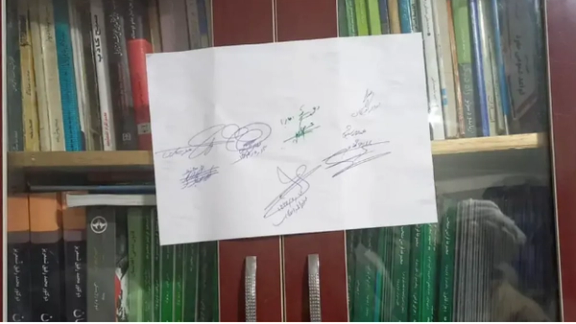Hundreds Of Books In Herat Libraries Deemed As 'Undesirable' By Taliban & Sealed

The Taliban in Herat has called hundreds of books in various fields in the province's libraries "undesirable" and sealed them.

The Taliban in Herat has called hundreds of books in various fields in the province's libraries "undesirable" and sealed them.
According to a list compiled by the Taliban, these books are mainly written in the fields of literature, history, human rights, constitution, democracy, and the Shia sect.
A copy of these lists has been obtained by Afghanistan International.
The Taliban has called books "undesirable" in the library of the Ahmad Shah Massoud Cultural Foundation, the library of Amir Ali Sher Nawai Women's High School, and the library of Sultan Ghiyasuddin Ghori High School.
It is said that these libraries belong to the education department of Herat province.
These books in various fields such as politics, human rights, history, literature, culture, religion, and Shiite sect are mainly written in Persian.
According to the lists prepared by the Taliban, the group's officials, under the name of the "Supervisory Board of Libraries of Schools in Herat Province", have deemed these books "undesirable".
At the end of the lists, the Taliban delegation wrote that the books have been handed over to the head of the libraries "until further notice”.
The Taliban has also attached pictures to the list that show that the bookshelves in these libraries have been sealed.
According to the list, the Taliban have sealed 667 titles of books in only three libraries in Herat. Sources said that the Taliban's surveillance and censorship goes beyond public libraries.
In the list published by the Taliban, at least three books by Abdul Latif Nazari, the Taliban's deputy minister of economy, can also be seen.
These books have been written by Nazari under the titles of "Citizenship Rights in Afghanistan", "The Concept of Democracy", and "Globalisation and Security in the Middle East". The Taliban has also called the Pashto translations of Nazari's works "undesirable" and sealed them.
After returning to power in August 2021, the Taliban began efforts to censor and remove books containing content that contradicts the group's ideology and strict interpretation of religion.
The Taliban's actions to restrict citizens' access to books come as a result of increasing restrictions on publishers, sellers, and importers of books.
In May this year, the Taliban's Ministry of Information and Culture announced that the "Book Evaluation Commission" had reviewed 20 books in a meeting and had not granted publication licences to some of them.
Mahajer Farahi, the Taliban's deputy minister of information and culture, also said that the group would prevent the publication of books that are against "Islamic values and traditions of Afghan society”.